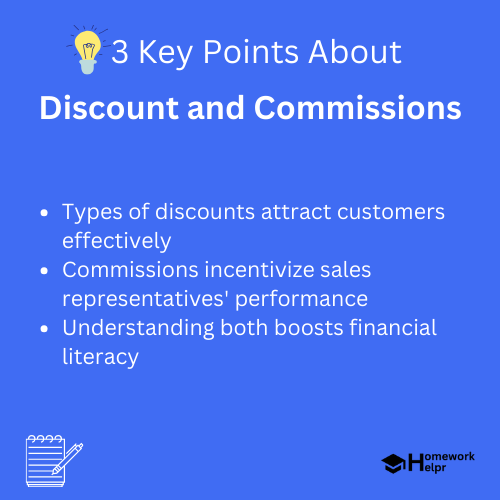📝 Summary
In business and finance, understanding discounts and commissions is crucial. A discount is a price reduction offered to attract customers and promote sales, with various types including cash, trade, seasonal, and promotional discounts. On the other hand, a commission is a payment to a salesperson based on their sales performance, motivating them to sell more. Both tools significantly influence purchasing behavior and can enhance business strategies by attracting customers and incentivizing sales staff. Recognizing their roles helps improve overall financial literacy.
Understanding Discounts and Commissions
In the world of business and finance, two essential concepts that come into play often are discounts and commissions. While they are different, both serve as important tools in retail and sales strategies. Understanding these concepts can help you become more financially literate and help you make better decisions in your personal and professional life.
What is a Discount?
A discount is a reduction in the regular price of a product or service. Businesses often employ discounts as a strategy to attract customers, clear inventory, or promote specific items. Discounts can be classified into various types:
- Cash Discounts: Reductions given for quick payment.
- Trade Discounts: Offered by manufacturers to retailers.
- Seasonal Discounts: Offered at specific times of the year, like holidays.
- Promotional Discounts: Special offers to promote a new product.
For instance, if a pair of shoes costs $100 and the store offers a 20% discount, the price you pay would be calculated as:
[ text{Discount Amount} = text{Original Price} times frac{text{Discount Percentage}}{100} = 100 times frac{20}{100} = 20 ]Thus, the final price would be:
[ text{Final Price} = text{Original Price} – text{Discount Amount} = 100 – 20 = 80 ]
Definition
Trade Discount: A reduction in price granted to businesses, often a percentage off the retail price. Cash Discount: A price reduction given for prompt payment of a bill.
Benefits of Offering Discounts
Discounts not only attract new customers, but they also encourage repeat business. Some benefits of offering discounts include:
- Increased Sales Volume: Attracts more customers, leading to higher total sales.
- Clearing Inventory: Helps in selling out old or excess stock.
- Building Customer Loyalty: Customers may return for future purchases.
Examples
If a local restaurant offers a 15% discount on meals during the week, it can significantly increase the number of customers who visit, particularly those seeking budget-friendly options.
What is a Commission?
A commission is a payment made to a salesperson or agent based on the sales they make. This incentive structure encourages individuals to sell more and can dramatically impact their overall earnings. Commissions often come in various forms:
- Flat Commission: A fixed amount paid per sale.
- Percentage Commission: A percentage of the sale amount.
- Tiered Commission: Different rates are applied based on sales thresholds.
For example, if a salesperson sells a car for $20,000 and earns a 5% commission, they would receive:
[ text{Commission} = text{Sale Amount} times frac{text{Commission Percentage}}{100} = 20000 times frac{5}{100} = 1000 ]Definition
Flat Commission: A constant fee paid per transaction, regardless of its amount. Tiered Commission: A payment structure where the rate increases as sales volume increases.
Importance of Commissions in Sales
Commissions play a critical role in motivating sales representatives. Benefits of using commission-based structures include:
- Increased Motivation: Sales staff are driven to increase their earnings through hard work.
- Performance-Based Pay: Commissions ensure that those who sell more are compensated accordingly.
- Aligning Interests: Both business and salesperson have vested interests in increased sales.
Examples
For instance, a real estate agent who sells a property worth $500,000 at a 3% commission earns $15,000, which incentivizes them to close more deals.
Comparing Discounts and Commissions
While discounts and commissions both aim to influence buying behavior, they work on different parties:
Discounts target customers by reducing prices, making products more attractive. In contrast, commissions target sales personnel, giving them a direct financial incentive to close deals or increase sales. Both concepts are vital to a business’s overall strategy and can sometimes intersect; for example, salespeople may use discounts as tools to facilitate purchases.❓Did You Know?
Did you know that the first recorded discount was in ancient Mesopotamia? People would barter goods and sometimes offered discounts to entice more effective trades!
Conclusion
In conclusion, understanding discounts and commissions is essential for anyone looking to navigate the world of sales and business effectively. Discounts can help businesses attract and retain customers, while commissions serve to motivate sales staff to perform at their best. By recognizing how these two concepts operate, you will be better positioned to make informed decisions whether you’re a consumer or an aspiring business professional. Embrace the importance of discounts and commissions, and you will find yourself ahead in your financial literacy journey.
Related Questions on Discount and Commissions
What are the different types of discounts?
Answer: Types include cash, trade, seasonal, and promotional discounts.
How do commissions work?
Answer: Commissions are payments based on sales performance.
Why offer discounts?
Answer: Discounts increase sales volume and customer loyalty.
What motivates sales staff?
Answer: Commissions provide financial incentives to boost performance.
